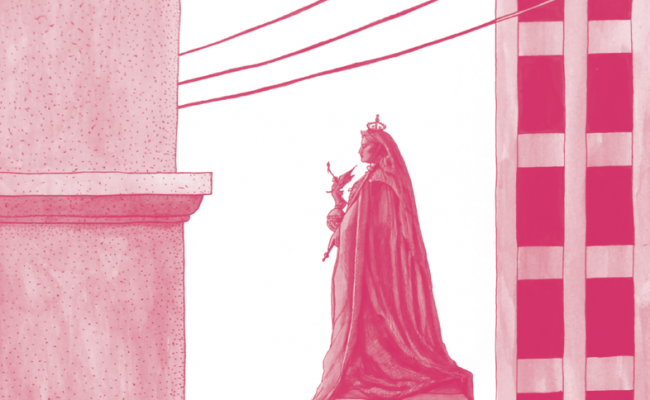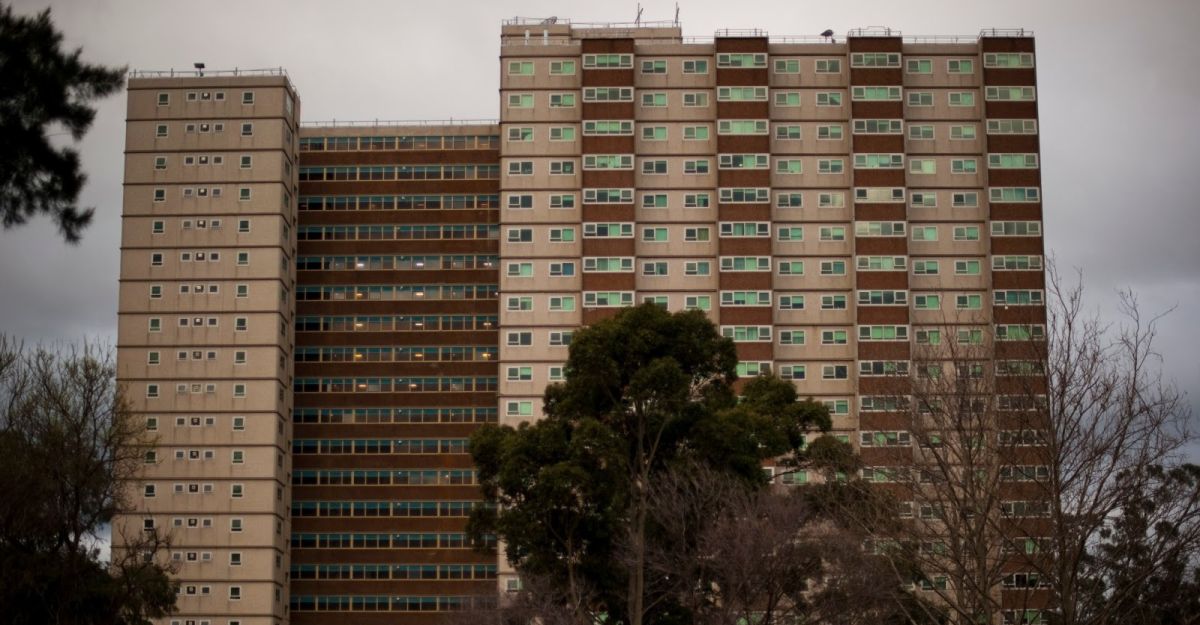For a man who has lived through almost one third of New Zealand’s modern history, Prime Minister John Key seems to know very little about it. ‘New Zealand was one of the very few countries in the world that were settled peacefully,’ he said a few months ago. ‘Maori probably acknowledge that settlers had a place to play and brought with them a lot of skills and a lot of capital.’ Many New Zealanders will nod gently while whispering to each other in conceited agreement: ‘Yes, we were not nearly as savage as those Australian settlers.’
It is the sort of claim that collapses into absurdity upon the slightest interrogation. The invasion of Parihaka, the centre of a non-violent campaign against European occupation, was far from peaceful. The incursion into the Waikato region was neither just nor necessary: it was designed to destroy the colony’s fragile peace. That Key can claim otherwise while his government presides over redress for colonial injustices reveals a remarkable degree of cognitive dissonance. Most New Zealanders are vaguely aware of their country’s unsettling past, yet prefer to reduce history to a neat transaction in which settlers arrive with ‘skills’ and ‘capital’ to bargain with Maori for their land. This is not done out of delusion or hypocrisy – revisionism is a deeply ideological act.
Memories of colonialism, like all memories, are about the present as much as the past. For David Lowenthal, the primary purpose of memory ‘is not to preserve the past but to adapt it [to] enrich and manipulate the present’. This is as true for settler societies as it is for Indigenous societies. Yet the former refuses to acknowledge it, and the latter has no power to implement it. Not many people would acknowledge that colonial history is as central to settler power as it is to the Indigenous sense of injustice. Better to ignore the first and minimise the second.
Without acknowledging that the past explains the present, it is possible – reasonable even – to conclude, like Key does, that New Zealand was settled peacefully. Or, like Canadian Prime Minister Stephen Harper, that a parliamentary apology represents full reconciliation for the social engineering that produced an Indigenous underclass. When history is denied or obscured, then lofty pronouncements about Indigenous recognition, government reports, commissions of inquiry and partial reparations look like nothing more than a legacy of failed handouts to the troublesome natives who are never quite capable of pulling themselves up. This delivers national oddities like Australian Prime Minister Tony Abbott, who can claim his country was unsettled before Europeans arrived and yet simultaneously push for a vote on constitutional recognition for Indigenous peoples.
Such contradictions suit Key, Harper and Abbott just fine. When Key denies New Zealand’s violent settlement and yet presides over redress for it, he can preserve settler society’s power while fulfilling the liberal narrative of progress and reform. When Harper apologises for assimilation and yet insists to the G20 only a year later that Canada has no history of colonialism, he can ignore the history that conferred power on one group. When Abbott denies pre-European settlement and yet pushes constitutional recognition on the basis of it, he can reduce Indigenous disadvantage to a legal matter rather than a question of power.
What makes this denial of history respectable is its ideological architecture. Underneath the settler–Indigenous dichotomy lie two different concepts of history. For the neoliberal right, Scott Hamilton writes, ‘history is nothing but the sum of the decisions that these free and rational individuals make’. It is a view that does not demand an interrogation of the past. For the left – and, I would argue, for Indigenous societies as well – history is the ‘determinant of human choices as well as the outcome of those choices’. This is the meaning of the idea that Indigenous peoples walk backwards into the future.
Without understanding how the past connects to the present, settler society has no reason to question its own power, or indeed its good conscience. If we are all free and independent beings, then what power an individual exercises will seem earned rather than inherited. Demonstrating the absurdity of power as a kind of credit – rather than an unequal social relation – requires collective action. It means transforming history from a mere record of the past to a living narrative practice, as the Ngāti Awa tribe has done by encoding it in their cultural expressions – not as a reminder of injustice, but as an explanation for it.
This is one of the stories they tell.
James Fulloon was a nineteenth-century every-man: surveyor, interpreter, political secretary and spy. Universally acknowledged as a ‘gentleman’, Fulloon was frighteningly precocious. With a proper religious education and impeccable ancestry, the boyish sixteen-year-old quickly emerged as a notable social climber in Auckland’s high society. At nineteen, the ambitious Fulloon became one of the colony’s most promising public servants. At twenty-four, after an apprenticeship with notorious Native Secretary Donald McLean, he accepted commission as a military captain, with instructions to raise an army.
Fulloon seemed to be everything the nineteenth-century assimilationists dreamed of, and proof that Maori were ‘the finest people British colonisation has ever come in contact with’. But he struggled to reconcile his competing identities. He wasn’t just a ‘half-caste’, he was the half-caste: a symbol of the civilising mission of the colonisers. In public, he seemed to delight in this status, though in private he revealed his fear that Maori, half-caste or otherwise, would always remain ‘a distrusted people’ and that this would serve as a convenient excuse for incremental cultural genocide. Fearful of disapproval, Fulloon hid his long-term partner, Teni Rangihapainga, from even his own sister. Half-castes were expected to take European partners, just as his mother had.
His mother, Koka Te Mautaranui, was a high-born member of the Ngāti Awa tribe. She was wedded to John Fulloon, an Anglo-French trader, in an arranged marriage, to secure a new economic relationship. James Fulloon, who was born in August 1840 at his mother’s home in Whakatane, a tiny town where the dusty eastern Bay of Plenty plains meet the Pacific Ocean, was thus not the son of civilisation but rather of the harsh logic of economic necessity.
Caught between worlds that were about to collide, Fulloon committed himself to the colonial government; he had few other options. War hysteria had gripped the country, and to choose anyone other than the colonial government, or anything other than colonialism, meant confirming one’s status as part of the distrusted. Fulloon accepted a posting in the Waikato, a rich agricultural region where the government was preparing to confirm ‘the fact of British sovereignty’. Fulloon sent regular reports to Governor George Grey alleging that Maori in the central North Island were planning an imminent attack on Auckland. The evidence was unconvincing, but Grey used the report as part of his pretext for full-blown war.
While the primary reason for war was economic – that is, the colonial government needed to ‘open’ the Waikato for development – the public reasons were political: local Maori were ‘treasonous’. Even though his reports played their part, Fulloon himself seemed conflicted. These were complex times, and questions of allegiance were not answered easily. Although he was a colonial army officer at the time of the conflict, Fulloon spent most of his time caring for victims of the war or trying to prevent colonial soldiers from looting Maori property. Fulloon would confide in a local magistrate that the conduct of the colonial forces made him ashamed to be part English. He could never abandon questions of identity.
It was a peculiar situation: Fulloon worked to mitigate the very war for which he had provided the political cover. It was this sense of conflicting loyalties that would get him killed. With conflict spreading to the eastern Bay of Plenty, Fulloon convinced Grey that an army made up of local Maori was needed to contain and oppose the Pai Mārire, the new religious movement blamed for the death of Reverend Carl Völkner, a suspected government spy. Fulloon travelled home and trusted his security to the fact he was returning to his own tribe, Ngāti Awa.
Fulloon seemed to want his people to choose the right side and thus to protect themselves from the devastations of war. In 1865, when he arrived in Whakatane, the cousin he expected to meet was conspicuously absent. The colonial contingent was instead greeted by proselytisers from the Pai Mārire, the very movement Fulloon had been sent to oppose. As the Pai Mārire party boarded a ship, Fulloon flicked his backside up and slapped one cheek ‘for the Hauhau’ and the other ‘for the Pai Mārire’. It was the whakapohane, the most grievous act of insult in the Maori world. The Pai Mārire killed Fulloon for it.
In life, Fulloon helped set a pretext for war; in death, he would become the pretext for extending it.
Fulloon’s mistake was to misjudge his own status. Half-castes were never intended to underpin shifting social relations in the colony – property was. The colonial government wanted to impose the relations of production and half-castes were a convenient cover. The half-caste identity was never power or protection – its access to property was. This is the history that is not told. Instead we speak of unscrupulous
settlers and misguided governments, because to acknowledge the systematic dispossession of Indigenous peoples would mean admitting that more than reparations are in order: ‘return’ is also owed.
This history leads to an Indigenous ‘problem’ in New Zealand, Australia and Canada. Fine words are spoken, government reports are compiled, commissions of inquiry are formed, money is spent and a new paradigm emerges – that of recognition and reconciliation. But of what and for whom? Recognition and reconciliation are based on the idea that the crimes of the past remain in the past, that they have no lingering effect, and that each country is therefore dealing with historical recompense rather than a continuing injustice. Thus, Harper can issue a parliamentary apology for Canada’s assimilation policies, then later claim his country had ‘no history of colonialism’. One aspect of the past is recognised, with the act of recognition taken as the act of reconciliation, even as the continuing injustice – colonialism – is denied.
Another example would be when Abbott reminded Australians that the country ‘owes its existence to a form of foreign investment by the British government in the then unsettled … Great South Land’, thereby reinforcing the continuing injustice of terra nullius, even as his government simultaneously pushes for Indigenous recognition.
Recognition only extends to some aspects of the past. Meanwhile, there is an expectation that any recognition will be accepted as a grand act of reconciliation, while ongoing injustices are not only ignored but also erased from the national consciousness: New Zealand was settled peacefully, Australia was not settled at all, Canada has no history of colonialism.
But selective re-remembering is not peculiar to the old dominions. In Britain and the United States, the glorification of empire is making a comeback. Historians like Niall Ferguson, a self-confessed ‘paid-up member of the neo-imperialist gang’, criss-cross the Atlantic selling the benefits of colonialism while underplaying its violence – it was, in their vision, all grand trunk railroads and high tea on the lawns.
In 2012, British Education Secretary Michael Gove invited Ferguson to rewrite the nation’s history curriculum. With Ferguson at the helm, it is easy to imagine a new history curriculum that is nothing more than a Kipling book club. New generations will be reassured that colonialism was nothing more than ‘taming the fluttered folk and wild’ and civilising ‘the half-devil and half-child’. British colonialism will be painted in what David Anderson calls a ‘warm, sepia-tinted glow’.
And so the same attitudes of the old dominions prevail in what EP Thompson once described as the last colony of the British Empire: Britain herself. If British colonialism is transformed into an event in the distant past, rather than a process with continuing effects, then the old conquered people have no special claims. As in her old dominions, Britain does not have to acknowledge where power lies and why. Thus, claimants like the survivors and victims of the Mau Mau uprising have no moral claim against the British government because no historical injustice occurred.
For the state, denying history is about preserving power. For the individuals who performed the dirty of work of colonialism, it is about justifying it. When anthropologist Margaret Rodman questioned former British colonial officers stationed in Vanuatu, a former Anglo-French ‘condominium’, very few were willing to address their role in managing and enforcing colonialism. Instead, most preferred to mediate their experiences through stories of child-like savages. The officers described their time with caricatures like the ‘docile axe murderer’ who they would regularly invite on hunting expeditions. The officers imagined themselves more like characters in a Nora Strange novel than the anti-heroes of Orwell’s ‘Shooting an Elephant’ – they were there to civilise, rather than to protect British commercial and economic interests.
Each act of denial, whether it is made in Canberra or London, serves a very clear purpose: to preserve and justify power. To protect that power against the advance of Indigenous peoples or from the claims of postcolonial states. It took the French national assembly thirty-seven years to recognise the Algerian War as a war for independence. Even at the height of hostilities, it was officially referred to as a ‘public order operation’.
With the death of Fulloon, Grey finally had the political excuse he needed to justify extending the colony’s aggressive acquisitive push into the eastern Bay of Plenty. Troops were dispatched with instructions to capture Fulloon’s killers. The result was a new frontier in the war for the central North Island. One thousand men marched passed the Ngāti Awa boundary and burned everything in their path: homes, crops, people. No-one knows the death toll because the victims were not important enough to count. Even now, the stories of rape victims survive in the collective memory of their descendants.
Thirty-seven men were eventually arrested for the death of Fulloon. Most had nothing to do with the act itself. The prisoners were transferred to Auckland, a city thriving due to the war-time economy, and then condemned to savage conditions at Mount Eden Prison. Three prisoners were executed, while sickness took another four. The rest were kept in underground cells where the only source of air and light was a sewer drain. When not confined to their cells, the prisoners were either chained in stockades or sent out for hard labour.
Those prisoners who were eventually released would return to their home to find that in 1866 the government had passed legislation to confiscate approximately 245,000 acres of land. The Ngāti Awa people were declared the ‘tangata hara’ – the criminal people – and made legal strangers on their own land. Small pockets of land were returned for subsistence, but barely enough for survival. Not only were the local people collectively punished for the actions of Pai Mārire killers from another tribe, but the confiscation of the Ngāti Awa’s economic base meant their punishment would be lasting.
To compound the indignity, the new settlers – some of whom were gifted the very land they had scorched only years earlier – were made rich off what is some of the finest agricultural land in the country. The tactic was part of the poorly named ‘plan for peace’, whereby military settlers were awarded confiscated land to deter further rebellion. The legacy of this continues to this day: while many Ngāti Awa people are still condemned to poverty on their own lands, the descendants of the settlers remain rich from the expropriated wealth of the Ngāti Awa.
The tragedy is that Fulloon never intended to bring the bloody wars of the Waikato to his people. He only wished to prove their loyalty to the colonial government. But while that may have brought Ngāti Awa people some protection against colonial aggression, it would not have protected Ngāti Awa lands. Maori land had to be converted to ‘property’ if the colony was to survive.
The story of Fullon and his Ngāti Awa people is far from unique. The war in the Waikato was bloodier and the hunger for property more fierce. Similar wars were occurring in Australia and Canada at the same time, and for precisely the same reason: constant acquisition. That is the logic of settler colonialism that New Zealand, Australia and Canada were built on. To this day, very few are willing to acknowledge it or remedy its continuing effects. To this day, power must be protected against the advances of Indigenous peoples.
But knowing why settler societies obscure and deny their past can help us figure out how to respond. At a personal level, it means abandoning what James Baldwin called the ‘habits of thought [that] reinforce and sustain the habits of power’. Power is not a cosmic force or natural law, it is a social construct.
The Ngāti Awa solution has been to transform collective history into social narrative. Perhaps this is not a universal solution, but if we understand that the more power history confers the more likely is it to be denied, then we have named the problem. We must not make the same mistake as Fulloon and think that identity underpins social relations. Power does, and those whose history is denied have all the power to lose.




